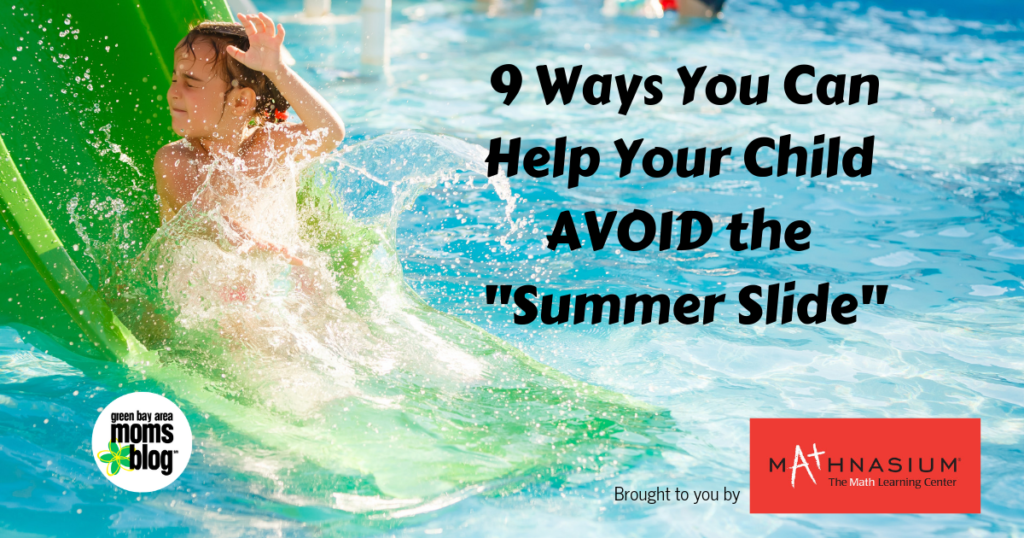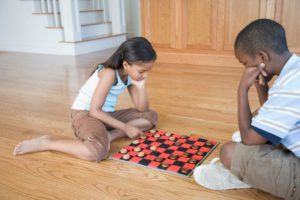
Have You Heard of the “Summer Slide”?
Summer is the time for kids to relax and enjoy the beautiful Wisconsin weather, but it is also when your child’s math knowledge is in danger of slipping away. Studies have shown students lose an average of 2.6 months of learning in math over the summer. The good news is, there are ways parents can combat what educators call, “the summer slide.”
Learning Loss in the Summer Is Real
According to researchers, summer learning loss can have long-lasting effects, including lower test scores, lower self-confidence, and lower chance of high school and college success. Teachers usually spend three to six weeks at the beginning of the school year reteaching math skills taught the previous spring. As parents, you’ll want to help your child avoid the summer slide.
Make It Fun
The summer is the ideal time to reinforce last year’s learning and introduce new concepts that will help in the year ahead. Children are less tired, have more time, and are better able to focus when they don’t have the burden of classes, homework, and extracurricular activities. Choose whichever activities you and your child will enjoy most, and have fun making memories that you both will cherish.
9 Ways to Make the Most of Your Child’s Summer and AVOID the Summer Slide
Here are some fun ways you can help your child avoid the Summer Slide, keep their math skills sharp, and be prepared for the year ahead:

1. Take them shopping.
Ask your child to find the discounts, compare prices and calculate multiple items. Bring coupons and ask them to compute the savings. Visit a farmer’s market for a fun, healthy, math-focused activity. Give your child some cash to spend. Let them find out what they can buy with it.

2. Math and sports go together!
Incorporate math while watching sports together. Encourage your child to keep statistics on their favorite Brewer’s player. Keep track of how much time passes between goals when you’re watching a soccer game. Compare Packer players based on touchdowns, yardage, and tackles made. If your child plays basketball in the backyard or at a nearby court, they can take measurements and compare them to an official-sized court.

3. Math is in your kitchen.
Good cooking requires good math! Following a recipe uses concepts like sequencing and counting. Baking requires precise measuring, and scaling a recipe requires multiplication or division. Start with something simple, like a smoothie recipe. Once your child is comfortable following a recipe, ask them to double it, which requires thinking proportionally.

4. Games. Games. Games.
Any board or card games that use money, keep score, or require strategy, such as 99, Sleeping Queens®, 4Way Countdown®, chess, blackjack, war, Monopoly®, and Scrabble® are math-based games. There are also plenty of fun games to play when you’re traveling. Playing games can improve your child’s numerical fluency, logic and probability skills. It is also a great way to spend time together without phones, iPads, or TVs! You can have fun and avoid the summer slide at the same time!

5. Read math-based books.
Having the extra time to read is one of the joys of summer. When math is an integral part of the story, your child gets the added benefit of thinking mathematically at the same time. Some titles to look for are “Secrets, Lies and Algebra” by Wendy Lichtman, “The Phantom Tollbooth” by Norton Juster, and “The Number Devil” by Hans Magnus Enzensberger. We have dozens more recommended books for all ages.

6. Introduce business to your child.
Everyone likes earning some extra spending money. Encourage your child to start a business doing yardwork, babysitting, or walking dogs in the neighborhood. Ask them to keep you informed of their income and profits on a weekly basis. It’s a great way to learn about accounting, calculating expenses, and managing profits.

7. Build….together!
When your child is involved with a home-improvement project, they are doing math as part of the process. Depending on the task, they will be working with numbers, spatial thinking, measurements, angles, calculating area, and problem-solving. It’s a wonderful way to accomplish a goal as a team!

8. Listen to music.
Music is inherently mathematical. The familiar patterns in your favorite songs follow a mathematical structure. Find out if your community has free summer concerts in the park. See what summer music activities are offered to children in your area. Listen to music together at home. Clap to the beat. Talk about the repeated patterns. Get up and dance!
9. Find the right summer learning program.
Summer presents valuable chances for kids to dig deep and explore concepts not necessarily covered in school, while learning at their own pace. Find a summer math program that specializes in creative, effective ways to teach math and works with your family’s summer schedule. Mathnasium offers Summer Workout Plans that focus on fractions, multiplication, algebra readiness, and more. We have fun and prepare kids to succeed in the coming school year.
Math Help for the Long Term
Summer math learning programs aren’t just for kids who are struggling; they’re for anyone who wants to catch up, keep up, or soar ahead. Parents who enroll their children in summer learning are not only taking steps to avoid the summer slide, they’re helping their child start the new year strong so they can keep moving forward.
This summer could be the season your child discovers how fun learning math can be!
![Logo-Mathnasium-Red-Background-US[8373] mathnasium green bay](https://greenbayareamom.com/wp-content/uploads/2019/05/Logo-Mathnasium-Red-Background-US8373-300x125.jpg)
More than forty years ago, math educator Larry Martinek was inspired to find a better way to teach children math.
As a classroom teacher, teacher-trainer, and consultant in public and top private schools—and father to a mathematically gifted son—Larry possessed a uniquely comprehensive view of education. He saw a troubling theme in mathematics instruction: a serious disconnect between the students’ basic skills training and the curriculum they were expected to master in the years to come. They weren’t being prepared properly for their future.
Larry set out on a mission: to find an approach that would provide children with the strong foundation they needed to succeed. Over the next three decades, he painstakingly developed and assembled a blend of methods and materials. Instead of relying on traditional rote memorization and repetitive exercises, Larry’s work focused on helping children understand math by honing their math instincts and getting them to think like mathematicians.
And it worked.
Today, more than 40 years after Larry first developed it, the Mathnasium Method™ is providing children all over the world increased confidence, critical thinking skills, and mathematical ability to last a lifetime.
Find our Green Bay Center here: https://www.mathnasium.com/greenbay
Check out their Facebook page here: https://www.facebook.com/greenbaymath/


















